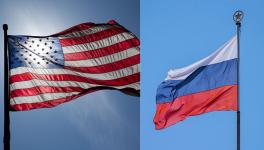How Washington's Money-Machine Stays Ahead of Democracy
The Hillary Clinton donor machine is the biggest in US history and for many Americans, her ties to corporations are just common sense. But major media outlets have along with the Clinton campaign, insisted that despite her proximity to Wall Street and fossil fuels and despite the recent WikiLeaks email revelations, there hasnt been a single instance of a quid pro quo kind of exchange between Clinton and her donors. But according to writer Doug Henwood and The Intercept journalist Lee Fong, thats not really the point.
DOUGE HENWOOD: Its just this seamless web of the foundation, the campaign contributions, the speaking fees.
LEE FANG: The Roberts court has chiseled away at the definition of corruption. Right theres been a number of cases that are trying to redefine what corruption means in America.
HEDGES: The dismantling of safety measures against corruption has created such a tight knit community among the nations elite, Henwood and Fong say, that finding evidence of quid pro quo is impossible because of how seamless the relationship between business and the public sector has become.
HENWOOD: I think its really hard to find the proverbial smoking gun in any of these emails. I think what they confirm is a sense that Hillary is deeply embedded in the American power structure, deeply loyal to it and there may not be specific transactions you can tie to these relationships but I think you can almost think of it as almost an anthropological sense. They exist in a very tight circle. They exchange favors. They exchange greetings.
HEDGES: But Hillary Clintons ties to industry arent by her own doing alone. Since the 1990s the democratic partys invited corporate forces into its inner circle. Robert Rubin, a former executive at Citi Group and former board member at Goldman Sachs became a leading architect in shaping Bill Clintons Wall Street policies for example. More recently, a WikiLeaks email shows how lasting Citi Group influence has bene on the democratic party.
In an email from then Citi Group executive Michael Froman to John Podesta who was co-chair of Barack Obamas transition team in 2008, Froman sent Podesta 3 important documents. They were suggestions for cabinet level appointments. The first, a list of candidates of color, the second of women, the third, a suggestion of how to distribute them.
The list of cabinet level positions ended up being mostly correct. For example, it identified Eric Holder for the Justice Department, Robert Gates for Defense, and Timothy Geithner for Department of Treasury, among many others.
HENWOOD: So they were already planning the transition. They were already planning the cabinet, well before the voters even decided who was going to be elected.
FANG: Its kind of a mundane document. Its just a document with a list of names. But its also credible because it was one, very accurate in terms of predicting who would be in the Obama White House and its very revealing because you have to put it in context.
This is at a time when the Wall Street banks including Citi Group where Michael Froman worked, were melting down. They were needing government assistance during the financial crisis and heres A heated campaign. Michael Froman was contacting the campaign on picking personnel while theyre still trying to win the election.
HEDGES: Ties between industry and the democratic party have only intensified. This election cycle, Clinton has amassed a group of 11 hundred so called bundlers who collected donations on her behalf. Obama had 770 four years ago.
HENWOOD: My favorite fact about the fundraising was the last couple of weeks of August, Hillary raised $150,000 an hour. Thats around the clock hours, not just when she is actively fundraising.
FANG: When you look at why these Wall Street banks and other corporate interests for that matter, why they spend so much in campaign contributions, why they do so much lobbying, a lot of times its to have an influence over these personnel picks. Of course the President picks all the cabinet members. But there are hundreds of other personnel decisions that oversee everyday life and especially on financial regulatory policy where banks like Citi Bank have a lot of money on the line.
HEGES: Unelected personnel picks became an issue during the democratic primaries when senate liberals including Bernie Sanders and Elizabeth Warren drew up a list of Wall Street people they would actively oppose. Clinton appointed them for her administration.
SANDERS: We certainly have seen under democratic and republican administrations; what Wall Street CEOs have done to our economy. We dont need more Wall Street CEOs in any administration. We need people in the administration who will stand with working families and the middle class and I will do everything that I can that those are the people appointed in a Clinton administration.
FANG: I think most political analyst agree that congress will still stagnant in many ways. We might see some movement on tax reform but very few other policies will really come out of the next congress, no matter what happens. It will still be very divided.
So where big policy actions will come from are the regulatory agencies and who Clinton or Trump for that matter, picks to head that agencies will have a bigger impact on polices than anyone elected in November.
Im sure if you could see the emails that are being sent and received today, theyre probably similar emails to that Michael Froman email to John Podesta back in 2008.
HEDGES: In 2008, Barack Obama ran on a campaign of hope, change, and reform. But that rhetoric, as the Michael Froman email displays, crumbled even before Obama got into office. He facilitated the end of the bank bailout, he appointed a Wall Street favorite to head the Department of Treasury.
Hillary Clinton on the other hand has not branded herself as a challenger to Wall Street. Thats seen in her taking contributions from registered lobbyists, something Obama refused to do in 2012, and its seen in her leaked emails and speeches to Wall Street.
HENWOOD: Were hearing a whole lot of talk now about how left will Hillary lean? Will the Bernie Sanders influence prove long lasting? How much pressure should she get now from people who want to push her to more progressive direction? It seems to me that the message of that email is theyve already pretty much got their cabinet and the kind of governing structure they want pretty much in mind. It may be already too late to influence those appointments but the pressure for those on the left that want to push her in that direction should be relentless and immediate.
End
DISCLAIMER: Please note that transcripts for Newsclick are typed from a recording of the program. Newsclick cannot guarantee their complete accuracy.
Get the latest reports & analysis with people's perspective on Protests, movements & deep analytical videos, discussions of the current affairs in your Telegram app. Subscribe to NewsClick's Telegram channel & get Real-Time updates on stories, as they get published on our website.
























